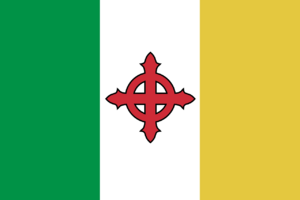Ebrarian people
Ebrarianos | |
|---|---|
 | |
| Regions with significant populations | |
| Ebrary | |
| Languages | |
| Ebrarese | |
| Religion | |
| Primarily Ebraricism, but also other Protestant, Orthodox, Aroman and other Christian denominations | |
| Related ethnic groups | |
| Gallasians, Vorsts, Aromance peoples |
Ebrarians are an ethnic group and nation native to Ebrary who speak the Ebrarese language. The Ebrarian identity originates in the Ebrarian city-states era from the 6th to 10th century. Their ethnonym is derived from the name of Marcus Ebraius, the Aroman general who founded the city of Ceres in 413 AD. The majority of the citizens of Ebrary are ethnic Ebrarians.
The Ebrarian population trace their lineage to the Ebraro-Celts who inhabited Ebrary before the arrival of Marcus Ebraius, and the various Aroman soldiers and migrants who came afterwards. The Aroman settlers founded a variety of city-states in the southern portion of the modern country of Ebrary. After the city-states were conquered by the Vorsts, the Ebrarian people were united as a kingdom under native rule in the late 11th century. Some definitions of Ebrarian people include, while others exclude, people descended from later migration into Ebrary.
Relation to other people groups
Aromance peoples
Ebrarians continued to refer to themselves as Aromanos (Aromans) for centuries after the colonization of Ebrary. It was not until they were conquered by the Vorsts that the Aroman-descended inhabitants of Ebrary referred to themselves as a unique people group.
Laimiaic speakers
A large minority of Laimiaic speakers were among the Aroman colonists who settled Ebrary during the era of city-states. Over time, these communities were mostly assimilated into the larger Fragran-speaking population. However, small communities of Ebrarian Laimiaic speakers did not completely die out in the port cities of eastern Ebrary until well into the 19th century. As of the modern era, these groups have also been completely assimilated.
Geltic peoples
Because the Ebrarian population is partially descended from the Geltic inhabitants of pre-Aroman Ebrary, Ebrarians have a notable genetic and cultural similarity to the Geltic peoples. However, Ebrarians are generally classified as Aromance peoples due to their language. After the Ebrarian Reformation, Ebrary saw a cultural Geltic Revival for some centuries after, with Ebrarians embracing a somewhat fanciful narrative about the culture of the Geltic Old Ebrarians. This revival occurred in reaction to modernizing influence as well as to differentiate the new Protestant culture from the old Aroman/Orthodox culture.
In modern times, relations between the Ebrarians and the Gallasian Geltic people are strained. Gallasians suffer from informal discrimination perpetrated by the dominant Ebrarian majority in Ebrary.
Nordic peoples
A small but persistent minority of Nordic people known as the Vorsts have lived in Ebrary for many centuries. Vorstish dynasties ruled over Ebrary on two separate occasions, including immediately after the initial phase of the Ebrarian Reformation. There is a small genetic contribution of Nordic genes to the Ebrarian ethnic group, primarily from the Vorsts. Today the Vorsts make up an ethnic minority in Ebrary, and relations between the Vorsts and Ebrarians have generally been congenial with minimal discrimination. However, this congeniality does not extend to other, pagan Nordic peoples from outside modern Ebrary.
Ebrarians outside Ebrary
While most Ebrarians live in Ebrary where they make up a majority, many Ebrarian emigrants and their descendants reside in, and are citizens of, other countries. Ebrarians have been emigrating from Ebrary in significant numbers since the 17th century, and currently many young Ebrarians leave for other countries to find employment as guest workers.
There is a small Ebrarian community in Great Anglia, centered in the capital of Godstone. The Ebrarian community there are descended primarily from loyalists to the Ebrarian monarchy, government employees and members of the nobility who fled Ebrary after the Ebrarian Revolution in the early 1980s. However some number of economic migrants from Ebrary have supplemented these numbers. The current pretender to the Ebrarian throne Marco V is resident in Great Anglia.